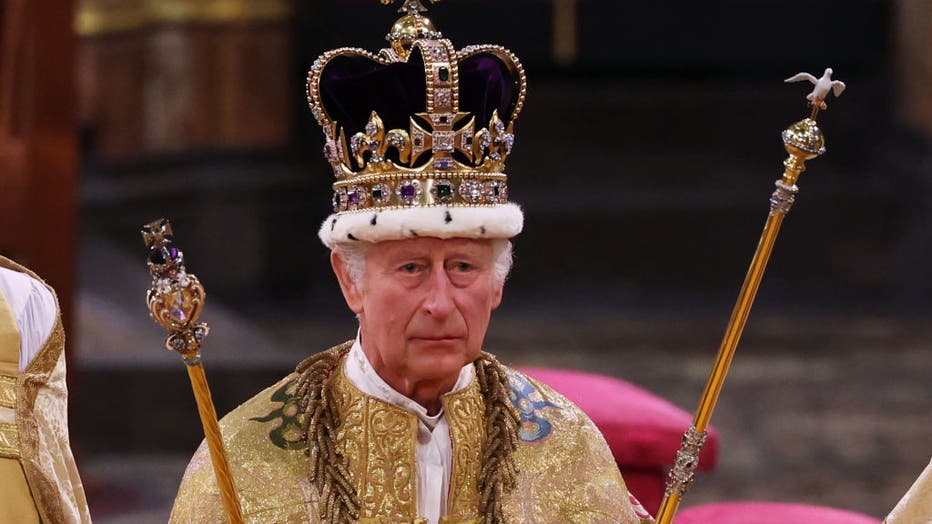Will King Charles III abdicate the throne following cancer diagnosis?
King Charles diagnosed with cancer
King Charles III has been diagnosed with cancer, according to officials. The Royal Family announced the King will suspend his public duties at this time to undergo treatment.
LONDON - King Charles III has been diagnosed with "a form of cancer" following his recent hospital procedure, according to a statement from Buckingham Palace.
The 75-year-old monarch is undergoing treatment and has been advised by doctors "to postpone public-facing duties," the statement continued.
The palace didn’t say what form of cancer the king has, but said it’s not related to the king’s recent treatment for a benign prostate condition.
What’s next for the king?
The news of the monarch’s health leaves many to speculate about the future of the royal family and whether or not Charles will remain on the throne through his treatment.
According to a report from the New York Post just days before the cancer diagnosis announcement, a former royal butler suggested that Charles could hand the crown over to his eldest son Prince William, in the next decade.
Paul Burrell, who worked under Princess DIana for over 10 years, said the 75-year-old king has a plan for when he wants to give up his throne.
"I think it will happen in this country. I think the king and queen have given this job 10 years, I think this is a 10-year plan," Burrell told the New York Post
"I don’t think he will want to continue being king when crowned heads of Europe have found that they can hand over to their heirs and see them become monarch and enjoy it," Burrell continued.

King Charles III stands after being crowned during his coronation ceremony in Westminster Abbey, on May 6, 2023 in London, England.
In a separate interview with the Daily Mail last month, royal biographer Phil Dampier said he also believes Charles could be looking to step down.
"It must make you wonder if, in five or ten years’ time, King Charles might think about doing the same if his health suffers or he just thinks it is a good time to pass on to William and Kate while they are still young," he said.
He referred to Queen Margrethe II of Denmark who last month stunned her country when she announced on New Year’s Eve that she will hand over the throne to her eldest son, Crown Prince Frederik.
It was the first time in nearly 900 years that a Danish monarch voluntarily stepped down from the throne.
Who’s next in line for the throne?
The succession to the British throne "is regulated not only through descent but also by Parliamentary statute," according to the royal family’s website.
Here are the first 15 people in order of succession:
1. Prince William, the elder son of Charles and the late Princess Diana. He is married to Kate, the Duchess of Cambridge. Their three children follow him in the line of succession.
2. Prince George of Cambridge, born in July 2013.
3. Princess Charlotte of Cambridge, born in May 2015.
4. Prince Louis of Cambridge, born in April 2018.
5. Prince Harry, the younger son of Charles and Diana.
6. Archie Mountbatten-Windsor, born to Harry and Meghan, Duchess of Sussex, in May 2019.
7. Lilibet Mountbatten-Windsor, born in June 2021.
8. Prince Andrew, Queen Elizabeth II and Prince Philip’s second-eldest son.
9. Princess Beatrice, elder daughter of Andrew and his former wife, Sarah Ferguson.
10. Sienna Elizabeth, daughter of Beatrice and Edoardo Mapelli Mozzi, born in September 2021.
11. Princess Eugenie, Andrew and Sarah’s younger daughter.
12. August Brooksbank, born to Eugenie and James Brooksbank in February 2021.
13. Prince Edward, the queen and Philip’s youngest child.
14. James, Viscount Severn, the younger child of Edward and his wife Sophie, Countess of Wessex.
15. Lady Louise Mountbatten-Windsor, Edward and Sophie’s daughter.
How has the royal family dealt with this before?
Last month, Charles departed from royal tradition with his openness about treatment for his prostate.
When U.K. monarchs had real power, news of illness was withheld for fear it might weaken their authority. The habit of secrecy lingered after royals became constitutional figureheads.
The British public wasn’t told that Charles’ grandfather, King George VI, had lung cancer before his death in February 1952 at the age of 56.
Abdication is becoming the new normal
Few royals in European history have given up their throne willingly, but it appears that that’s beginning to change.
It’s now the norm in the Netherlands for older monarchs to pass on the crown to younger generations.
In 2013, when Beatrix abdicated in 2013 following in the footsteps of her mother, Queen Juliana, and grandmother Queen Wilhelmina.
Not long after Beatrix, Belgium’s King Albert II and Spain’s King Juan Carlos I retired and were succeeded by their eldest sons.
Norway’s 86-year-old King Harald V, who has been hospitalized several times in recent months, has not indicated he’s considering abdicating in favor of his son, Crown Prince Haakon. Neither has Sweden’s 77-year-old King Carl XVI Gustaf, who last year celebrated 50 years on the throne.
The Associated Press and Catherine Park contributed to this story. It was reported from Los Angeles.

